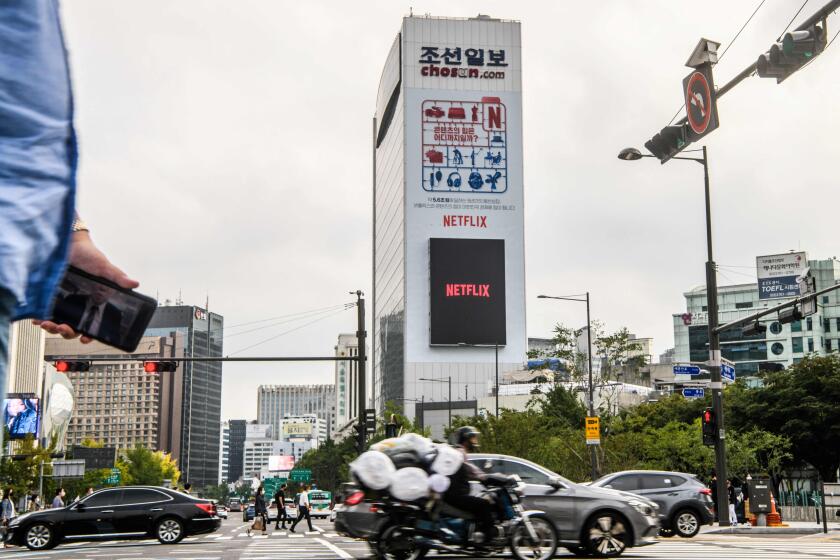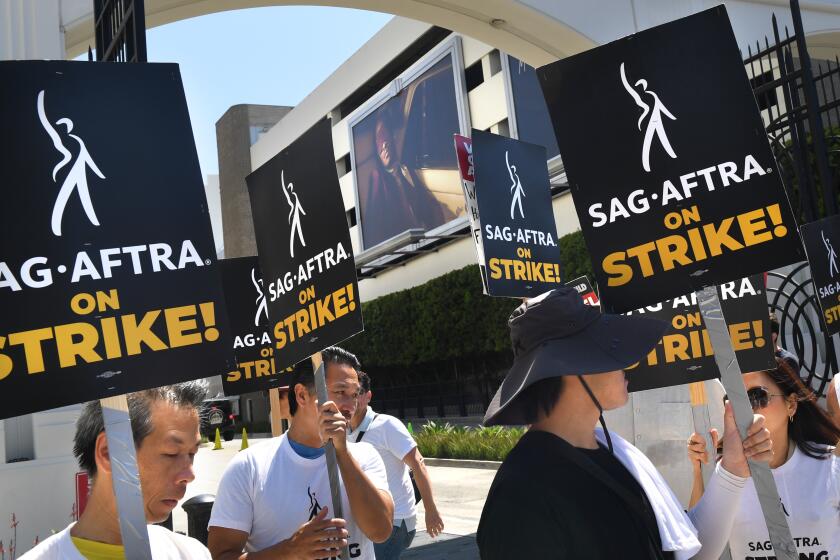Column: Hollywood saw global TV as strike insurance. Workers of the world have other plans

This spring, as the chances of a writers’ strike moved from “possible” to “inevitable,” Netflix CEO Ted Sarandos claimed, with what could easily be construed as smugness, that his streamer could weather a strike because of its growing library of international content.
And it is certainly true that Netflix has offered American audiences something rarely seen on the small screen before: films and TV series from all over the world in their original languages (with subtitles and dubbing available).
This is not, however, the result of cultural beneficence. Netflix is an international company serving a worldwide audience and the cost of production in many of the countries it serves is much lower than in the United States.
Due, in part, to the fact that many of those countries do not have entertainment unions as strong or agile as those in the United States.
But if Sarandos and the CEOs of all the other studios planning to lean on international content to get them through the WGA and SAG-AFTRA strikes thought that the fear of seeing even more jobs go overseas would force American writers and actors to pare down their demands, they appear to have underestimated the power of artistic solidarity.
It isn’t just American actors and writers who want to be paid fairly. It’s all of them.
Netflix has provided immense opportunity for South Korean actors — but just for those at the top. The company declines to meet with the actors’ union.
As my colleague Max Kim recently reported, actors in South Korea, where Netflix is spending billions to amp up its post-“Squid Game” presence, are also angry about the lack of residuals and low pay for all but the biggest stars.
The Korea Broadcasting Actors Union may not be as powerful as SAG-AFTRA at the moment — according to Kim’s reporting, Netflix has refused even to meet with them — but that appears to be changing as members realize they too are being treated unfairly by the streamers.
Elsewhere, the British actors union Equity was among the first to issue a strong message of support for the SAG-AFTRA strike. Under British industrial legislation regulations, actors there who are members of both SAG-AFTRA and Equity cannot legally stop work on shows currently in production, including “House of the Dragon.”
But Equity leader Paul Fleming said the union will do everything it can to prevent the U.K. from being used “as a backdoor” to undermine the SAG-AFTRA strike, including fighting to reform the “draconian” regulations that prevent Equity actors from striking.
In July, “Succession’s” Brian Cox, “The Crown’s” Imelda Staunton, “Mission Impossible’s” Simon Pegg and other A-list British actors rallied in London and Manchester in support of SAG-AFTRA.
Actors in other countries are also currently bound by laws that make it impossible to stop work without risking dismissal, fines and lawsuits, against individuals and their union — Apple TV+ thriller “Tehran” received an interim agreement from SAG-AFTRA because it was originally produced in Israel. In Australia, SAG-AFTRA members have walked off shows for studios represented by the Alliance of Motion Picture and Television Producers while local productions have carried on.
But no matter the legal situation, most international actor unions have expressed support for SAG-AFTRA’s strike because, as Eleanor Noble, national president of Canada’s Alliance of Cinema, Television and Radio Artists, recently said: “We recognize that their fight is our fight and is for the good of all performers.”
With writers and actors on strike, the studios have a full-blown labor revolt on their hands — and they have no one but themselves to blame.
Rising anger, rhetorical resolution and statements of solidarity may have little impact on members of the Alliance of Motion Picture and Television Producers in the short run. But any hope that the studios would simply skate by on the backs of writers and actors abroad appears to be in vain — and just as they risk setting off a wider revolution in the Hollywood labor force with their actions, they also risk awakening a sleeping giant in the fast-growing ranks of entertainment workers overseas.
Divide and conquer tactics can be perilous. Openly acknowledged inequality for profit — we don’t need to worry about the Americans because we can just rely on the Koreans/British/Canadians/etc. — can turn division into multiplication in the blink of an eye.
The rise in international production cuts both ways. It may be exciting, and occasionally lucrative, to work with an American studio, but no actors, in any country, want to be seen as the cheap-labor solution to the studios’ bottom-line problems. Like their American counterparts, they love what they do but they also expect to be paid fairly for it.
Plus, Sarandos may be overestimating the appetite English-speaking Americans have for international fare — “Squid Game” was great and I like a French murder mystery as much as the next gal, but even I’m not willing to surrender entirely to subtitles.
As actors in other countries weigh in with their concern and outrage over their low and/or decreasing wages, it’s tough not to see an underlying, and very troubling, tenet of the entertainment industry: that artists should, at some level, be grateful they are paid at all for what they do.
Among the general populace, this attitude toward creative work appears to be changing slightly; COVID-19 gave everyone a crash course in the fragility of the labor force and a greater appreciation of workers’ rights. The WGA and SAG-AFTRA are just two of many unions who went on strike this year; the working class of just about every industry is being examined with an increased degree of awareness and even sympathy.
But among the upper echelon of Hollywood studios, there remains a strange contempt for the very work that supports the industry. Anyone who is not already a big success, and even some of those who are, is expected to feel nothing but gratitude for the chance to be part of a writing staff or a cast — that the potential success of their show or film, and the possibility of working again, should be payment enough.
And if they can’t hack not getting paid a living wage, they should quit and get “a real job.”
Because there are, by this logic, thousands of people in other countries willing to do it for less.
Never mind the craven inhumanity of such an attitude; it is also self-destructive. If studios make it impossible for writers and actors to live on what they make, they very well may seek other jobs. And then who will be left to make film and TV? There aren’t enough A-list writers and actors to go around, even with artificial intelligence. You can only make “Being John Malkovich” once.
Institutionalized poverty is not a business model, and Americans do not, historically, take kindly to shipping jobs overseas.
Realizing that their favorite new Korean streaming series was made not only to punish American unions but also at the expense of its Korean writers and actors probably won’t make U.S. audiences keen to keep paying higher subscription fees.
With balance sheets suddenly running black thanks to production stoppages, and international film and TV reaching wider stateside audiences, studio executives appear to have thought they could ignore the unions’ “unrealistic” demands because, well, the world was their oyster.
Unfortunately for the studios, that oyster has a few demands of its own. Netflix and its peers have simply drawn attention to their own “unrealistic” demands — and learned that the pesky desire for fair pay knows no borders.
If the studio execs want to prevent a worldwide labor revolt, they should start by ending the strikes at home.
That, or get a real job.
More to Read
The biggest entertainment stories
Get our big stories about Hollywood, film, television, music, arts, culture and more right in your inbox as soon as they publish.
You may occasionally receive promotional content from the Los Angeles Times.













